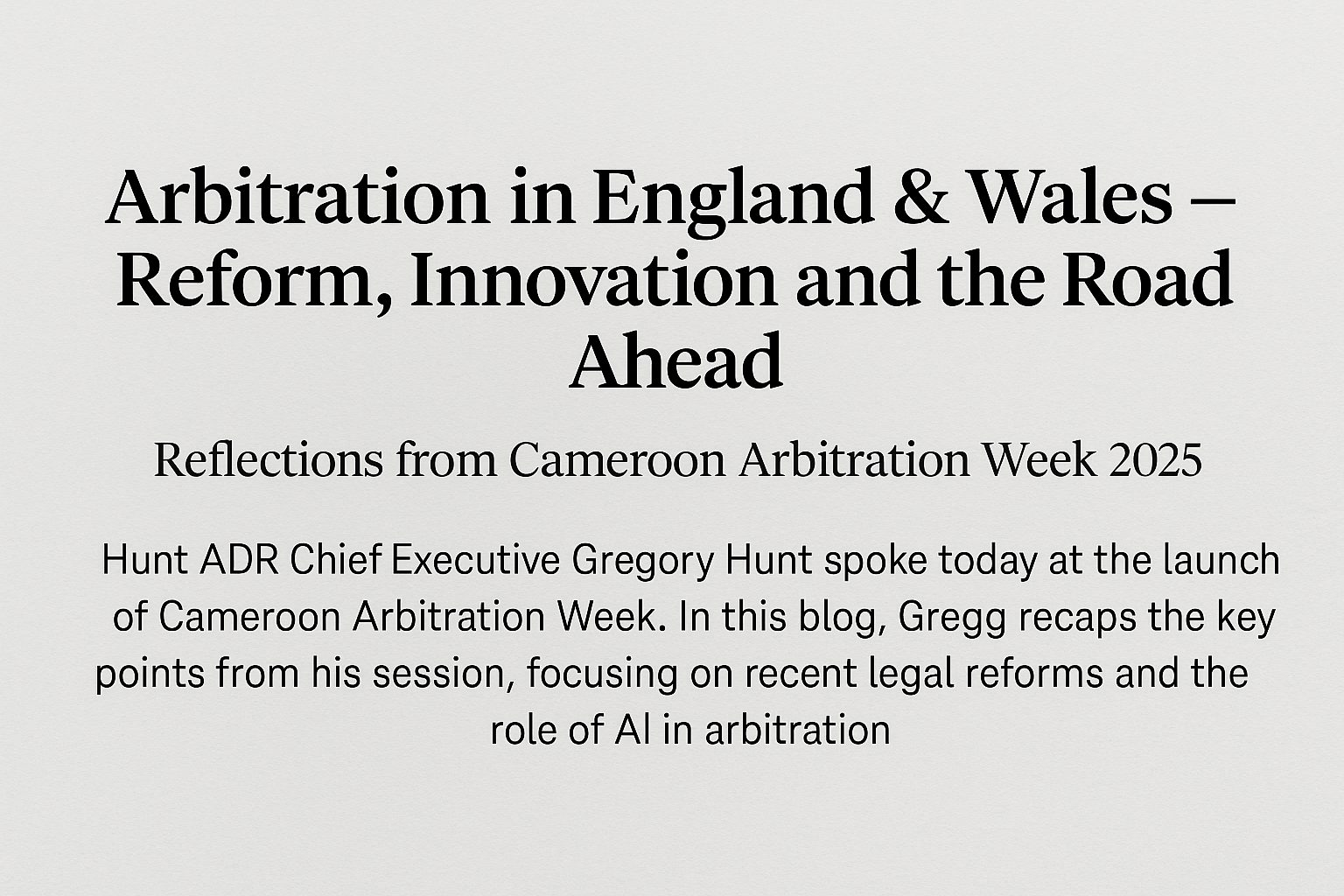
Arbitration in England & Wales – Reform, Innovation and the Road Ahead
Reflections from Cameroon Arbitration Week 2025
Hunt ADR Chief Executive Gregory Hunt spoke today at the launch of Cameroon Arbitration Week. In this blog, Gregg recaps the key points from his session, focusing on recent legal reforms and the role of AI in arbitration.
Let me begin by again thanking Julius Nkafu and the team at Cameroon Arbitration Week for the kind invitation to speak. It was a pleasure to join such a dynamic event and share a few thoughts on the future of arbitration in England & Wales. It was also a pleasure to be on a panel with friend and colleague Stephen Ward, and to meet Shaun Wallace for the first time.
My session focused on two core themes: the evolution of arbitration law in England & Wales, and the growing contribution of artificial intelligence in supporting users of arbitration services.
30 Years in Arbitration: A Focus on Access and Innovation
While not an arbitrator myself, I’ve spent 30 years working in arbitration administration and business development. From overseeing Travel Arbitration – Europe’s longest-running consumer scheme – to launching the Private Arbitration Court (PAC) and helping new arbitrators through the Arbitrator Experience Programme, my focus has always been on improving access to justice and encouraging best practice.
Arbitration remains strong in the UK, particularly in England, and London continues to stand out as a global centre for dispute resolution, supported by a respected judiciary and a well-established legal framework.
The Arbitration Act 2025 – Modernising a Trusted System
The most significant recent development is the introduction of the Arbitration Act 2025, which modernises but does not replace the Arbitration Act 1996. The new Act strengthens the system while preserving its flexibility and autonomy.
I highlighted three key changes during my talk:
- Duty of Disclosure
I believe arbitrators should live by three core principles (indeed, we all should): independence, integrity, and impartiality. The 2025 Act now places arbitrators under a statutory obligation to disclose any circumstances that might give rise to justifiable doubts about their impartiality. I would expect any arbitrator I work with to do this as standard, but it’s good to see the Act tightening practice, especially as the duty continues throughout the arbitration, not just at the outset.
- Summary Disposal
Tribunals are now empowered to summarily dismiss claims or defences that are manifestly without merit. This is a pragmatic tool to improve efficiency and reduce the cost of dealing with unmeritorious arguments. I see many cases where this new power could be used to good effect.
- Presumed Governing Law
The Act clarifies that, unless otherwise agreed by the parties, the law governing the arbitration agreement is presumed to be the law of the seat. This brings welcome certainty following years of doctrinal complexity after Enka v Chubb.
Together, these reforms help maintain England’s reputation as a reliable, efficient, and fair arbitration jurisdiction.
Looking to the Future – AI in Arbitration
I closed my remarks by turning to the future and the increasing role of AI.
AI is already shaping how arbitration services are delivered not (yet) in deciding cases, but in supporting parties, arbitrators, and administrators through better access to information and guidance.
A good example is Arbi, the AI assistant developed by Hunt ADR to support users of the Private Arbitration Court, which we operate in collaboration with The Barrister Group. Arbi helps explain the process, signpost key documents, and answer questions about arbitrator selection and procedure.
As tools like this develop, I believe we’ll see real improvements in efficiency and user experience, not through automation of decisions (yet), but through smarter support at every step.
Thanks again to Julius and to everyone who made the event possible. It was a privilege to take part, and I look forward to continuing the conversation.
